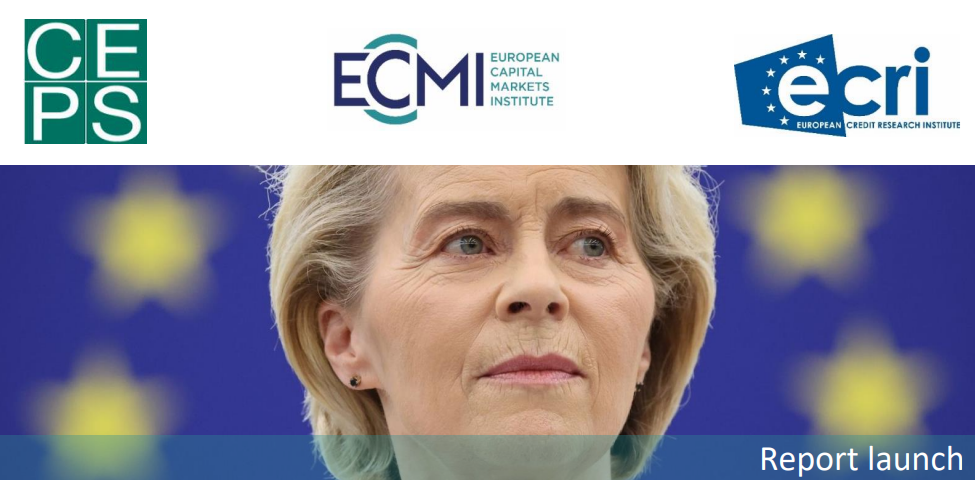On the 17th of September, CEPS, ECRI, and ECMI held an event on the future of financial policy in Europe, bringing together a diverse group of experts, policymakers, supervisors, and academics. The event aimed to examine the evolving financial landscape and address the challenges that lie ahead for the European Union’s financial sector.
Over the past 15 years, financial markets have undergone significant regulatory changes—from crisis response measures and the founding of the European Supervisory Authorities (ESAs) to the creation of the Single Supervisory Mechanism (SSM) and the launch of the Capital Markets Union (CMU). More recently, the focus has shifted towards sustainable and digital finance agendas. This intense period of rule-making raises a critical question: what comes next? Particularly as the EU’s financial sector faces declining competitiveness, as underlined by the recently published Draghi report.
Set up in October 2023, CEPS and its sister organizations, ECMI and ECRI, convened a series of five closed-door meetings to delve into these issues. The resulting report analyzes European financial market developments over the last few decades, reviews EU-level achievements in financial market regulation, and puts forward concrete recommendations for improving the regulatory and legislative framework. The goal is for these recommendations to be considered by the European Commission as it begins its work over the next few months.
Key Discussions and Insights
Jesper Berg highlighted concerns about overly complicated regulations and emphasized the importance of addressing issues within banks while they are still valuable and salvageable. In the context of the CMU, he suggested focusing on key initiatives such as shifting the savings structure from traditional bank savings to other forms like pensions and life insurance, which can invest in capital markets and better drive growth.
John Berrigan from DG FISMA noted that while there is widespread agreement on diagnosing the problems facing the CMU, consensus on solutions remains elusive. He cautioned against replicating past cycles of reactive and excessive regulation following crises. Berrigan stressed that financial markets can significantly benefit the economy if they remain stable and advocated for proportionality in regulatory actions. He emphasized the need to boost the retail market through simple, low-cost, and accessible products, potentially requiring tax reforms. Additionally, he highlighted the importance of securitization for banks and the benefits of consistent application of rules through single supervision.
Eva Maria Poptcheva, a former MEP, called for enabling the fusion of businesses to compete globally and advocated for cross-border consolidation of banks and businesses, which should coincide with cross-border financing. She pointed out that among the top investment banks active in Europe, only one is European, underscoring the need for stronger European players. Poptcheva also stressed the importance of addressing fragmentation in capital markets to increase liquidity and broaden the investor base.
Judith Arnal from CEPS ECRI emphasized the need to preserve the competitiveness of internationally active banks by simplifying the regulatory landscape, particularly concerning the AI Act and ESG regulations. She called for simpler rules for smaller banks and suggested that development in the CMU should start with the consolidation of post-trading infrastructures. Furthermore, she highlighted that financial regulation alone cannot solve all issues and stressed the importance of increasing financial literacy to encourage responsible risk-taking by retail investors.
COFACE-Families Europe’s Perspective
While the event shed light on critical financial issues, COFACE-Families Europe wishes to highlight some concerns and priorities that align with our core values of non-discrimination, equal opportunities, respect for human rights, empowerment, social inclusion, and solidarity.
- Financial Inclusion and Consumer Rights: The push to increase retail investment as a means to finance the European economy raises concerns about shifting risks onto individual savers. European families should not bear the brunt of systemic shortcomings by being compelled to take on higher risks in the stock market, especially when many existing financial products, such as pensions, offer poor or even negative returns. Reports from Better Finance on the real returns of pension products have highlighted these inadequacies, making it challenging to incentivize consumers to invest.
- Overreliance on Debt-Based Systems: The current overdependence on banks for lending, due to a predominantly debt-based monetary system, exacerbates economic cycles—overextending credit during booms and causing credit crunches during downturns. There is a need for innovation in money creation and exploring alternatives.
- Harmonizing Insolvency Rights: For the CMU to be genuinely effective and inclusive, there must be a harmonization of insolvency rights for individual consumers. This step is crucial to enable cross-border credit and ensure that all citizens can benefit from financial services without disproportionate risk.
- Focusing on Social Aspects and Resilience: Financial markets should not prioritize stability and competitiveness at the expense of consumer rights and citizen welfare. Policies should focus on fostering resilience among EU citizens and families, ensuring that financial inclusion is at the heart of regulatory frameworks, something which has not been mentioned during the meeting, and which is central to implementation of the European Pillar of Social Rights.
As the European Commission considers the recommendations from the CEPS report, it is imperative to integrate perspectives that prioritize the well-being of families and individuals. Financial regulations should not only aim to enhance competitiveness and efficiency but also ensure they contribute positively to society and the implementation of social rights.
For further information about the event, click here.





